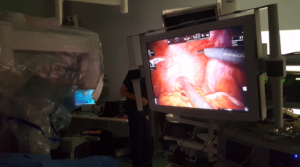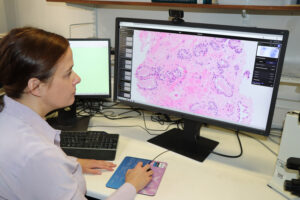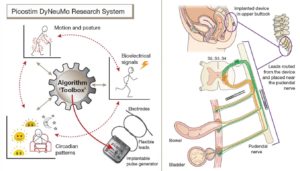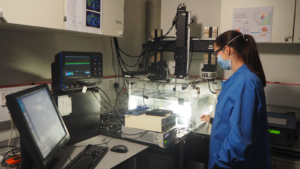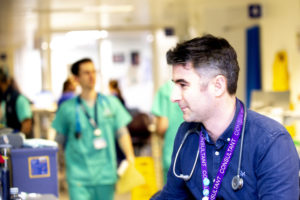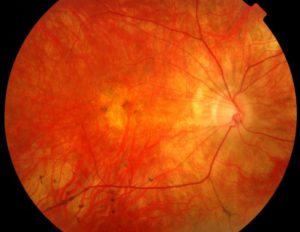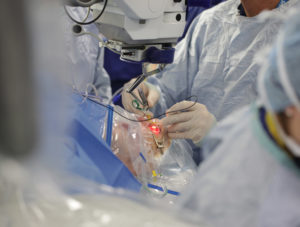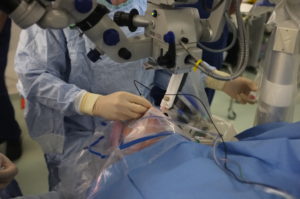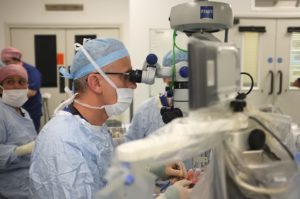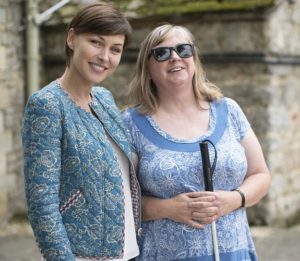Oxford researchers have been awarded up to £600,000 from Cancer Research UK (CRUK) to create the world’s first vaccine to prevent ovarian cancer. Scientists at the University of Oxford’s MRC Weatherall Institute of Molecular Medicine (MRC-WIMM), led by Professor Ahmed Ahmed, are designing ... READ MORE
News for Surgical Innovation, Technology and Evaluation
Glowing dye helps surgeons eradicate prostate cancer
A glowing marker dye that sticks to prostate cancer cells could help surgeons to remove them in real-time, according to new research. Scientists at the University of Oxford and Oxford University Hospitals NHS Foundation Trust, supported by Cancer Research UK and the NIHR Oxford Biomedical ... READ MORE
New NIHR Oxford Senior Research Fellows named
Researchers from a wide range of disciplines have been appointed to be the next cohort of NIHR Oxford Senior Research Fellows – seven mid-career researchers identified as having the potential to become future translational research leaders. As in previous years, the selection ... READ MORE
Prostate cancer AI diagnosis tool begins evaluation in Oxford
New artificial intelligence software that can help to spot prostate cancer is being trialled by researchers at Oxford University Hospitals (OUH) NHS Foundation Trust Researchers and clinicians in Oxford have begun an evaluation of artificial intelligence (AI) software that could help ... READ MORE
Bioelectronic implant offers intelligent therapy to treat incontinence
The first participants in a clinical trial of a bioelectrical therapy to treat incontinence have received their 'smart' bioelectronic implants. Amber Therapeutics, a University of Oxford spin-out company developing intelligent bioelectrical therapies, applied the Picostim-DyNeuMo research ... READ MORE
Oxford BRC researchers named NIHR Senior Investigators
Seven Oxford academics, six of them supported by the NIHR Oxford Biomedical Research Centre (BRC), have been named National Institute of Health Research (NIHR) Senior Investigators in recognition of their outstanding leadership in research. The NIHR describes its Senior ... READ MORE
BRC eye surgeons outline latest sight restoration approaches
Ophthalmologists from the University of Oxford have outlined the main sight restoration technologies currently being explored by leading eye surgeons. In an article published in Nature Biomedical Engineering, the authors, who are supported by the NIHR Oxford BRC, identified the major techniques ... READ MORE
Study investigating targeted drug delivery by focused ultrasound for pancreatic cancer opens
University of Oxford researchers have begun recruitment to a study looking at whether chemotherapy medication can reach pancreatic tumours more effectively if encapsulated within a heat-sensitive shell and triggered with focused ultrasound. The Phase I PanDox study, which is supported by the ... READ MORE
Oxford academics named NIHR Senior Investigators
Four academics supported by the NIHR Oxford Biomedical Research Centre have been awarded a prestigious national award. The University of Oxford professors have been named National Institute of Health Research (NIHR) Senior Investigators in recognition of being “among the most prominent and ... READ MORE
Challenges around recruitment and retention in surgical trials highlighted
A study by Oxford BRC-supported researchers has identified the main challenges associated with the recruitment and retention of participants in surgical trials in the UK. The study was part of the PIRRIST project, which aims to enhance recruitment and retention in surgical trials by ... READ MORE
Eight BRC projects get RCF funding
Eight Oxford BRC proposals, many covering a number of themes, have been awarded NIHR Research Capability Funding (RCF) funding to take forward key areas of research. The selected projects that will be supported include: Developing a research centre devoted to urgent and acute careThe ... READ MORE
BRC researchers’ work recognised with Vice-Chancellor’s Awards
A number of Oxford BRC-supported researchers have been recognised in this year’s University of Oxford Vice-Chancellor Innovation Awards. The Vice-Chancellor Innovation Awards celebrate research-led innovation that is having societal or economic impact. Prof Robert MacLaren, who leads the BRC’s ... READ MORE
Gene therapy shows promise in tackling common cause of childhood blindness
The results of a first-in-human clinical trial of gene therapy to treat a common cause of genetic blindness have shown partial reversal of sight loss in some patients. X-linked retinitis pigmentosa, caused by mutations in RPGR gene, is the most common cause of blindness in young people. The ... READ MORE
Oxford professors appointed NIHR Senior Investigators
Four leading healthcare academics in Oxford have received a prestigious national award. The University of Oxford professors were named National Institute of Health Research (NIHR) Senior Investigators in recognition of being “among the most prominent and prestigious researchers ... READ MORE
World’s first gene therapy operation for common cause of sight loss carried out
Researchers in Oxford have carried out the world’s first gene therapy operation to tackle the root cause of age-related macular degeneration (AMD), the UK’s most common cause of sight loss. The procedure was carried out at the John Radcliffe Hospital by Prof Robert MacLaren, Professor of ... READ MORE
First human test of robotic eye surgery a success
The first trial of robot-assisted eye surgery in patients has shown the technique to be both safe and effective. Researchers from the University of Oxford, supported by the National Institute for Health Research (NIHR) Oxford Biomedical Research Centre (BRC) have completed the first successful ... READ MORE
Oxford medical researchers win prestigious national awards
Leading health researchers in Oxford have been recognised in a prestigious national competition. Eight professors have been named National Institute of Health Research (NIHR) Senior Investigators in recognition of their “outstanding contribution to clinical and applied health and social care ... READ MORE
Second key step for eye robot trial
A robot has been used to inject a drug into the back of the eye in a world first for the next phase of a landmark clinical trial at Oxford’s John Radcliffe Hospital. Prof Robert MacLaren used the remotely controlled robot to administer a tiny volume of blood dissolving agent tPA under the retina ... READ MORE
World first for robot eye operation
Surgeons at Oxford’s John Radcliffe Hospital have performed the world’s first operation inside the eye using a robot. Robert MacLaren, Professor of Ophthalmology assisted by Dr Thomas Edwards, Nuffield Medical Fellow, used the remotely controlled robot to lift a membrane 100th of a millimetre ... READ MORE
“Bionic eye” to feature on ITV documentary
The story of a patient who was among the first in the UK to receive the world's most advanced 'bionic eye' is to feature on ITV this month. Nikki Watson’s story will feature on “What Would Be Your Miracle?” on ITV 1 on Thursday, May 12 at 9pm. The 48-year-old, from Devon, was diagnosed with ... READ MORE

